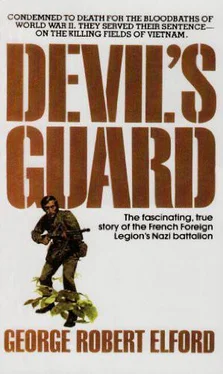We stopped firing.
The planes came in one after another. More bombs, more rockets, more napalm. Secondary explosions began to rock the hills. Hundred-foot flames and gray smoke rose from the valley. The forest that had hidden the Viet Minh base so conveniently now became a sea of flames. Where we stood at six hundred yards away, we could read the engraved serial numbers on our guns.
The raid lasted for only twenty minutes. When the planes departed the base no longer existed. “Just give the French a chance and they will do a magnificent job,” one of my gunners remarked appraisingly. “Look at that valley… none of their bombs went off target.”
I called Schulze and Krebitz and told them to move closer to the target. Our descent was easy, as the entire hillside was now bathed in light. Along the edge of the inferno we spotted small groups of running shapes: the survivors. We approached the jungle road as close as the heat permitted us, then began to pour bullets into everything that still appeared to move, not quite knowing if our targets were fleeing terrorists, panicked animals, or only some crazily waving bushes illuminated by the fire.
We moved on, skirting the Red Highway, dealing death and destruction as we went, not knowing that those were our last weeks of glory in Indochina.
For our last battle we lost.
It was not Viet Minh guns that ended the saga of the Headhunters… just as it was not the Red army of Stalin which defeated the German Wehrmacht. The Wehrmacht had been defeated in the Hinterlands. We were defeated in Paris—in the Chamber of Deputies.
Having realized that they couldn’t beat us in the hills, the enemy embarked on a last desperate offensive. Not only the Viet Minh but the entire Communist world joined forces to win that final and decisive battle. It was not to be fought with machine guns but with printing presses, radios, and loudspeakers—and not in the jungles of Indochina but in the capitals of the world.
“SS marauders in the French Foreign Legion massacre innocent civilians,” the Communist press screamed.
“Hitler’s scum at large in Indochina.”
“How long will the French government tolerate?”
“Outrage! Outrage!” And what the regiments of Ho Chi Minh could not achieve in five years the international Communist fifth column accomplished in five weeks.
We were ordered to return to Hanoi.
The consternation among the international Communist parties could be well understood. “The SS marauders” had arrived at the principal Viet Minh highway between China and Saigon. Six vital guerrilla bases had already been destroyed. In manpower and material, the Viet Minh losses were enormous. The fate of the whole “liberation” movement in the south was at stake. They had to stop us—at any price.
So the battalion was disbanded. The ranks, with time to serve, were incorporated into the various mixed units of the Foreign Legion. Those who had already “worked overtime” could choose between transfer or resignation. We resigned. We were free to leave and the world suddenly seemed wide open. Only then did it occur to us that we were French citizens, officers and honorable reservists of the Army of the Republic. Vive la Republique! When Erich Schulze married Suoi in a civilian ceremony, he no longer needed a permis from the forces. Nor did Helmut Riedl need one to hear the happy “I do” from the little Indochinese nurse Noy.
A few weeks after our departure, Colonel Simon Houssong handed in his own resignation. Not because he was a Nazi or because his former SS marauders were embarrassing him now. The colonel was a true patriot, and we regarded him a great soldier who did not feel like becoming a member of a team which might be compelled to sign the articles of surrender. “For whatever they may call it, it will be surrender,” I remember his saying. The colonel thought that France had signed enough articles of surrender—on the wrong side of the table.
The “Battalion of the Damned” had ceased to exist. It lived exactly 1,243 days, during which it destroyed 7,466 guerrillas by body count, 221 Viet Minh bases, supply dumps, and camps; it liberated three hundred and eleven military and civilian prisoners from terrorist captivity and covered roughly 11,000 kilometers on foot.
We lost 515 men—for us a very heavy loss indeed.
Once again the guns of Nguyen Giap could roll freely. The jungle trails became highways and the forts of the Foreign Legion turned into graveyards. The French soldiers could fight bravely and go down gloriously. They were not permitted to win. They had been stabbed in the back again, as they had been so many times in the past, by their own superiors, by their own government.
Seven hundred days later came Dien Bien Phu, but the Indochina war did not end there. It did not end with the fall of Hanoi and the loss of the northern territories either.
It went on… It is still going on… It will go on for a long time to come…
The End












